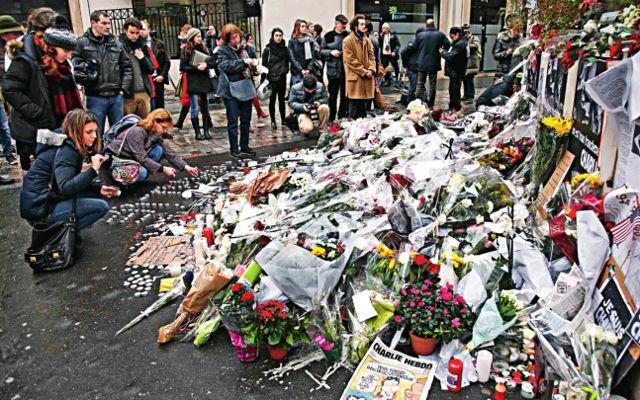Bloodbath in Paris and Freedom of Speech
By+SAJJAD+MALIK
THE beautiful city of Paris suf- fered the worst type of violence in decades when armed militants stormed the office of a satirical magazine and gunned down 12 people, mostly journalists. The attack is not only shocking but also alarming, raising questions about personal safety in an era of relentless violence. The attack has also done huge damage to Western culture and will continue to sour relations between locals and the thousands of peaceful Muslim citizens of and emigrants to European countries. Many of these people have nothing to do with political Islam, but they may be directly or indirectly impacted by the ghastly incident.
The attackers motive is clear, since they raised slogans and announced that they wanted to avenge the “blasphemous cartoons” published by the magazine. There are several different sides to the gruesome attack, but what intrigues me is the issue of freedom of speech. The killing of journalists has lifted the entire debate about freedom of expression to a new level.
Let me at the outset express my deep belief that free speech is a fundamental right of people and that it should not be curtailed by any extraneous considerations. I sincerely hope that a day will come when people will learn to live with free speech as it is, instead of erecting legal and other barriers to it. I am not sure when that day will come as I dont see it on the horizon just yet.
The people of the western hemisphere may have tasted some of the fruits of free expression. There have been some anti-Christian movies and literature like the Da Vinci Code novel, which is quite ruthless in its descriptive unraveling of Christianity. Though the book attacks the base of that religion, I cant find any example of extreme violent expression against the novelist or the makers of the movie based on the novel. This is just one example, and there are many others.
But the situation in Muslim countries is different due to a totally different view of Islam as a religion. That is why there was such a violent reaction across the Muslim world when The Satanic Verses was published in 1988. The situation has not changed more than two decades later, when at least 50 people were killed in riots and protests across the Muslim world after the “blasphemous movie,” Innocence of Muslims, was uploaded on YouTube in 2012.
These incidents show that freedom of expression is not believed to be absolute by people across the world, especially in Islamic countries. The issue of religion is quite delicate. The bland statement that all human beings are entitled to use their faculty of speech in the way they think best has several grey areas. Since we are still a long way away from the ideal society that tolerates dissent and accepts other viewpoints, it is necessary to create balance to save people from chaos and violence. Some countries try to balance freedoms by laying down certain red lines, though the issue of red lines is itself quite contentious. It is like the definition of “terrorism” or “obscenity” – we do not have a universally agreed-upon definition of these words. Often they are used in a way that is best suited to the user. The same is true about freedom of speech and the problem of imposing reasonable bounds upon it. Many people around the globe would agree that the concept of free speech varies according to culture and individual choices. Most of the time, it is left to individuals themselves to exercise self-censorship and avoid words and statements that would offend listeners or readers. For example, use of abusive language would fit the range of free speech, but few would approve of its use.
I am in no mood to suggest curbs on free speech, but I am thinking aloud that saving lives from violence may be as important as granting people their right to say whatever they want. If some people or nations erect barriers, then maybe it is important to accept this as their right and wait until they see fit to lower these barriers. It is important to have an understanding of different religions, societies and governments and their respective systems.endprint

